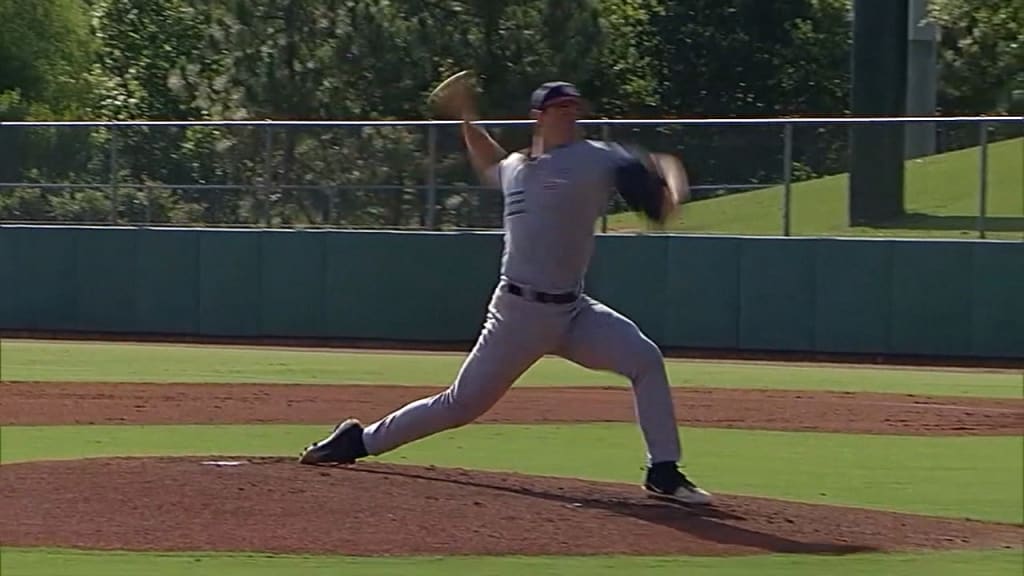Mets get No. 13 Draft prospect Allan at No. 89
This browser does not support the video element.
NEW YORK -- After the first two rounds of Major League Baseball’s Draft, the spotlight dims and the pace quickens. Teams have just 60 seconds between picks. Things can change in one-minute intervals. Decisions must come rapidly.
The day had barely just begun Tuesday when the Mets found themselves on the clock in the third round, ready to make the 89th overall pick, staring at the top of their Draft board. One name popped out: Matthew Allan, a right-handed pitcher from Seminole (Fla.) High School, whom many scouts figured would go in the first round. Stopping teams was Allan’s reported price tag: A request for $4 million, which is first-round money, and six times more than the slot value for the 89th pick. An offer short of that would likely send Allan to the University of Florida.
Quickly, Mets officials, including general manager Brodie Van Wagenen, made the proper calls, receiving assurances from Allan’s representatives that he would sign if drafted. Then they pulled the trigger on a player who vice president of amateur scouting Tommy Tanous called “one of the top right-handed high school pitchers in America today."
“This talent isn’t there in the third round very often,” Tanous said, adding that he was “very surprised” to see Allan fall to the Mets. “It was too good to pass up. It felt like you throw Matt Allen in with Brett Baty and Josh Wolf, and I can’t remember starting a Draft with the Mets, or any other team I’ve been with any better than that.”
Baty and Wolf were the Mets’ first- and second-round picks, a power-hitting third baseman and a high-ceiling pitcher. Allan clocked in above both of them on MLB Pipeline’s pre-Draft rankings, mostly due to his upper-90s fastball, power curveball and developing changeup. Allan recently changed the grip on the latter pitch from split-fingered to three-fingered, giving the Mets reason to believe he can turn it into another plus offering.
“There’s just a ton to like about Matt -- not only what he does on the field, but also off the field,” Tanous said. “He’s got a warrior work ethic. A very serious student of the game. Somebody that’s only going to get better. He just checks a lot of boxes in the pitching category.”
If any doubts remained that the Mets could sign Allan, they silenced them with some financial gymnastics the rest of the day. The Mets’ next seven picks were all four-year college seniors, who typically sign for less money than juniors or high schoolers because they don’t have the leverage in negotiation of heading back to college. Between those seven and Baty, who was projected to go lower in the first round than the Mets’ slot at No. 12 overall, the team feels it can save enough money to satisfy Allan’s demands.
“We fully expect Matthew to sign,” Tanous said. “Obviously, we had to make some allocations in our selections after that. We feel like we had a really, really good second day of the Draft. But yeah, we fully expect Matt to sign and to get out there this summer. We’re very confident that’s going to happen.”
The Mets entered this year’s Draft with a bonus pool of $8,224,600, which they must spread amongst their first 10 picks -- typically, but not always, in descending order. If they exceed that pool by up to five percent, they must pay a 75 percent tax on the overage. No team has ever outspent its bonus pool by more than 5 percent, and for good reason. Those that do are subject to the loss of a future Draft pick, with penalties growing only stiffer from there.
Given the rigid nature of Draft finances, the Mets found themselves scrambling Tuesday in their Draft room in Florida to make sure they could sign a player they loved. They could do so knowing that all picks in the first three rounds are protected. If Allan doesn’t sign, the Mets will receive a compensatory pick after next year’s third round.
“It’s very difficult. You’re in real time. You don’t have a lot of extra moments to be thinking about things,” Tanous said. “So yeah, there’s risk, but there’s also reward. And in the third round, we felt like it was a good time to take that chance.”

